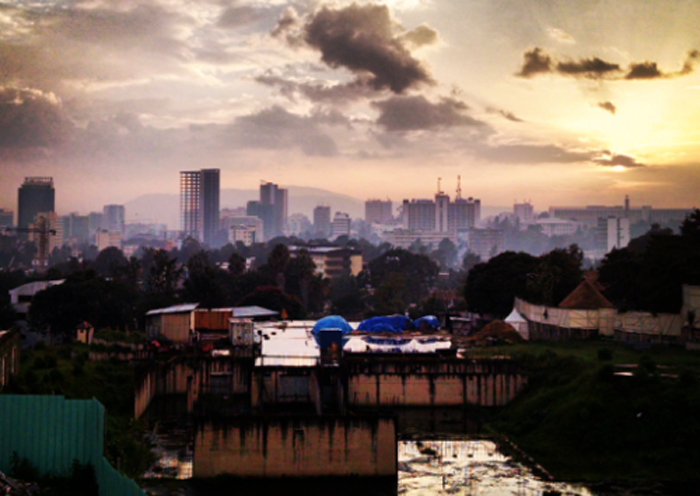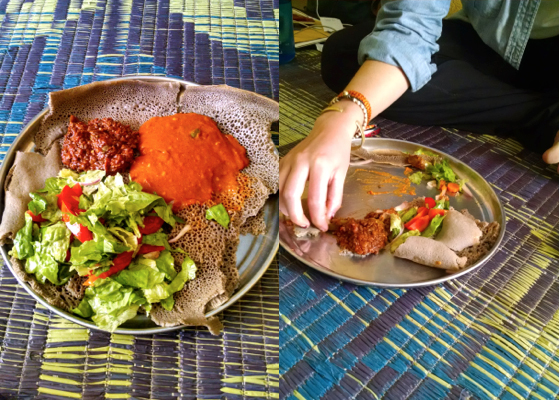10 amazing things tourists love about Ethiopia
Ally, one of the many tourists that enjoy Ethiopia, shares 10 things that she loved in her stay in the country.
 1. There’s always food and drink to share – Hospitality is paramount in Ethiopia. Inviting people to your home is common and with that invitation comes the promise of at least tea, but most likely a coffee ceremony and/or a meal. People invite friends, neighbors, the messenger who simply poked their head in or even someone who simply walks by your open gate with calls of “itto” or “buna setay,” “get in” or “drink coffee.” On holidays and regular days alike, Ethiopians are incredibly generous with food and drink. It is not at all uncommon for my landlady to knock on my door at 9pm holding a steaming plate of food or a pitcher of sua, just because. Holidays in particular are a testament to this hospitality – endless rolls of injera, countless servings of spicy doro wat and more cups of coffee and sua than one should count are all commonplace and offered to every guest who drops by (and even to those lucky passersby who happened to walk by at the right time).
1. There’s always food and drink to share – Hospitality is paramount in Ethiopia. Inviting people to your home is common and with that invitation comes the promise of at least tea, but most likely a coffee ceremony and/or a meal. People invite friends, neighbors, the messenger who simply poked their head in or even someone who simply walks by your open gate with calls of “itto” or “buna setay,” “get in” or “drink coffee.” On holidays and regular days alike, Ethiopians are incredibly generous with food and drink. It is not at all uncommon for my landlady to knock on my door at 9pm holding a steaming plate of food or a pitcher of sua, just because. Holidays in particular are a testament to this hospitality – endless rolls of injera, countless servings of spicy doro wat and more cups of coffee and sua than one should count are all commonplace and offered to every guest who drops by (and even to those lucky passersby who happened to walk by at the right time).
2. Welcome to the family – I have been welcomed into two families as a daughter, have been embraced by a town, and generally feel a warmth and welcome from people everywhere I go in my daily life, which has nothing to do with me and everything to do with Ethiopians. Objectively, my existence here in rural Ethiopia as a foreigner (one of two for at least 40km) should provoke far more alienation than it does. Sure, people stare, some kids call me “ferenji,” foreigner, I can always turn heads when entering a room but mostly people have received me in a way I would have never expected (and would, unfortunately, never expect to find in the US). Two families have made me a part of theirs from the beginning with no questions asked and a large majority of people in town greet me by name or as “teacher” and seem genuinely happy to see me. It never ceases to floor me that this happens, that it is the norm experienced by many Peace Corps Volunteers in Ethiopia. Maybe it is another aspect of hospitality, but Ethiopians are some of the most welcoming people I’ve ever met. We Americans should take note and adopt some of these practices.
3. “Stranger danger” doesn’t seem to apply – I cannot begin to explain how it feels to have countless children yell your name, run up to you for a handshake or a high five, to be greeted in the middle of nowhere with calls of “Ally, Allu, Ahri, selam!” from children you’ve never laid eyes on before. Kids who can barely walk see me coming down the road and race (as fast as their little legs can carry them) away from their mothers to give me a handshake. I cannot separate my “ferenji-ness” from myself here, and many kids are eager to say hi for this reason. But the startling fact is, especially coming from an American context where any interaction with someone else’s children is steeped in perceived dangers and extreme wariness, parents encourage this, some even seem as tickled as I am when their kid yells my name and trots over to shake my hand.
4. Everything is better together – Ethiopia is very much a communal society. People want to spend time with others. I can’t count the number of times I’ve heard people say “I never want to be alone, it is best to be with other people.” In many ways this stems from generally small living quarters and residing in remote, rural areas. By contrast, America is very individualistic place – I never knew my neighbors, never wanted to, didn’t strike up conversations with my seat mate on airplanes and wouldn’t think of playing with a stranger’s child on the street. Go to a bus station or airport where people are just waiting around or sit with half your body on someone else’s because the bus is so crowded and you’ll see that Ethiopians are, in general, eager to create community wherever they go. They chat with people they’ve only just met like they are old friends, they allowed their kids to roam and play knowing that their neighbors and strangers alike will look out for them, they treat their neighbors as extended family and hang out together all the time.
5. A willingness to help others and generosity abounds – People routinely go out of their way to help others. I am continually astounded by the degree and frequency which people are willing to help both their friends and strangers alike. Someone tracking down a bus for me and ensuring I would have a seat, giving me food and a place to charge my electronics without even asking because the power is out in my house, small acts like these feel huge and are entirely commonplace. I got sick at a student’s house in a remote village and her family (who were desperately poor by American standards – no electricity, water or toilet in sight and a 2 hour walk from the nearest town) concocted 4 kinds of medicine and made a special meal for me. Friends give each other injera when they know the other hasn’t any in her house, they stop to help a neighbor chop down trees outside his house on their way to school, they are more than willing to teach a fellow English teacher’s classes for a semester so she can take an early maternity leave. These acts of generosity and thoughtfulness are as extraordinary to witness as they are common.
6. Self-motivated students – Getting an education in Ethiopia is no easy task. Students face countless obstacles – having a 2 hour commute to school, living alone in town because their families live too far to make a daily commute possible, having no one to push them at home to do their homework or study, enduring, at times, brutal corporal punishment. Despite these and countless other barriers, students genuinely want to learn. These students find it within themselves to take as much advantage as possible of school, to study continuously, to seek out any available resources (which are few) to further their knowledge. They take responsibility and initiative to learn, which in a system where many students simply sit passively in class for 6 hours, is quite remarkable. These students understand that education is the key to success and are truly self-motivated to achieve it– it is inspiring.
7. Ethiopia knows how to do coffee – Coffee is central to Ethiopian life – for socializing, as a sign of that welcoming hospitality, to stave off boredom – a coffee ceremony is the solution. Coffee ceremonies are an intricate ritual that celebrates all the wondrous properties of the coffee bean: the smell when roasting, the rich brown color they become after the perfect roast, the satisfying crunch when grinding by hand, and most importantly, the delicious taste. There is nothing more enjoyable, more relaxing than sitting with friends for hours enjoying this perfect Ethiopian specialty.
 8. All food tastes better when you eat with your hands – Almost all food in Ethiopia is eaten with your hands, or rather your right hand…eat with your left and prepared for people to be slightly aghast. Injera, the staple spongy sour-ish flatbread, cannot really be eaten with anything but. In addition to injera, there are many varieties of wat, s’ebhi, stew to put on top, from daal-like lentils, spicy shiro, k’ay wat (literally “red stew”, a very spicy stew with large pieces of meat on the bone in it), salad, and countless other varieties. And the best way to eat any of it is with your hands. The only utensils many people own are spoons, which aren’t used for eating but instead for stirring (large amounts) of sugar into that delicious coffee I just mentioned. Injera and the amount of spice may take some getting used to, but Ethiopian food is by far some of the most unique and delicious food out there.
8. All food tastes better when you eat with your hands – Almost all food in Ethiopia is eaten with your hands, or rather your right hand…eat with your left and prepared for people to be slightly aghast. Injera, the staple spongy sour-ish flatbread, cannot really be eaten with anything but. In addition to injera, there are many varieties of wat, s’ebhi, stew to put on top, from daal-like lentils, spicy shiro, k’ay wat (literally “red stew”, a very spicy stew with large pieces of meat on the bone in it), salad, and countless other varieties. And the best way to eat any of it is with your hands. The only utensils many people own are spoons, which aren’t used for eating but instead for stirring (large amounts) of sugar into that delicious coffee I just mentioned. Injera and the amount of spice may take some getting used to, but Ethiopian food is by far some of the most unique and delicious food out there.
9. MacGyver would be proud of the innovation – Ethiopians are innovative, resourceful and creative. Your sandal broke, you want a toy but you only have wire and old cans, your textbook has seen 10 years too many students and is completely falling apart? What you would think are lost causes, Ethiopians fashion the best MacGuyer-esque fixes I’ve ever seen and create the coolest stuff from nothing. Americans have largely bought into the idea that nothing is fixable and if something it broken, we should just buy a new one. This idea does not apply here. Instead, people use ingenious solutions to fix a multitude of household items and there is a whole section at market devoted to recycling and reusing. Everything is reused, refurbished, repurposed. An old deck of cards, toilet paper rolls and a roll of tape go a long way and I’m pretty sure this kid doesn’t care his new favorite game is a product of recycling.
10. It is a strikingly beautiful and diverse country – Ethiopia is a land of diversity – of people, languages and landscapes. In a country the size of approximately 6 western US states put together, there are jungles, volcanic mountains, arid deserts, green mountain highlands, urban sprawl and almost everything in between. Its beauty is rugged, rustic, ruthless at times, but if anything it never disappoints.
Source: http://allyinethiopia.tumblr.com/ All pictures are taken by Ally
